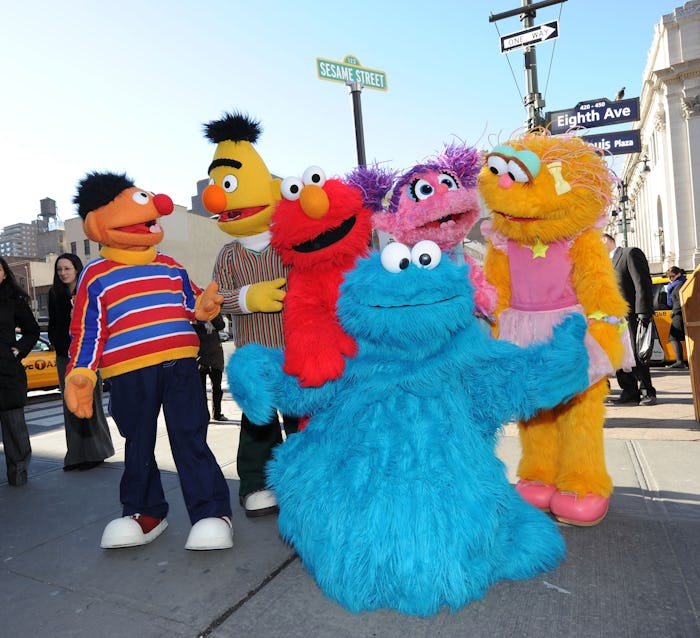Entertainment

5 Other Puppets That Are Needed On 'Sesame Street'
Sesame Street has been a staple of children's television programming for nearly 50 years. It's had many a cast of characters over the years, with its share of both live actors and their brightly colored muppet companions. In 2015, Sesame Workshop announced it would introduce Julia, a muppet with autism. After nearly two years of working with organizations like Autism Speaks and Autism Self Advocacy, Julia will make her television debut in two episodes later this current season as it airs on HBO; the cable network bought Sesame Street in 2015 with exclusive first-run rights before episodes can air on PBS stations.
Julia illustrates how Sesame Street remains current with issues affecting children, from even their youngest viewers and their families, both at home and in the international versions of the show. Takelani Sesame, the South African version of the show, introduced Kami, the HIV-positive muppet, in 2001. At the time, HIV and AIDS were one of the most prevalent health issues facing South African children. In 2011, Sesame Street introduced Lily, the "food insecure" muppet, reflective of the 17 million Americans affected by hunger and food insecurity. And four years ago, viewers met Alex, a muppet whose father is in prison — again, reflective of the 1 in 28 children in America with at least one parent in prison.
With Sesame Street often at the forefront of reaching children affected by some of the biggest issues facing young people, here are five other muppets that are needed just as much as Julia.
A Muppet With Undocumented Parents
With a president so focused on building walls and refusing refugees entrance into the United States, a muppet with undocumented parents is a no-brainer. According to the Center for Migration Studies, there were more than 5.1 million U.S.-born children with undocumented parents living in the United States. Trump's immigration orders, as well as his promises to "deal with DACA with heart" — DACA referring to the Deferred Action Childhood Arrival — have fostered an era of confusion, fear, and xenophobia that's palpable even among young children. A muppet with undocumented parents could go a long way toward helping to assuage those fears and educate parents.
A Muppet That Defies Gender Norms
According to the American Academy of Pediatrics, children develop awareness of the physical differences between boys and girls by the time they're age 2. By 4 years old, most children will identify as one gender or the other — but they don't always identify with the gender that matches their sex at birth.
While Sesame Street doesn't necessarily need to introduce a transgender muppet, as trans-identities can take years to fully form, a muppet that defies gender norms can provide both children who are exploring gender fluidity — and their families — with a supportive, compassionate framework from which to reference on TV.
A Muppet With Same-Sex Parents
In 2013, the Williams Institute, a sexual orientation, gender identity, and law think tank out of UCLA Law, released a massive report outlining the state of LGBTQ parenting in the United States. According to its research, there are approximately six million children and adults who have LGBTQ parents in the United States. With same-sex marriage bans struck down by SCOTUS in 2015, it's actually pretty surprising that a muppet with same-sex parents doesn't already exist on Sesame Street, to be honest.
A Tech Literate Muppet
A 2015 study in Pediatrics has found that 97 percent of children have used a mobile device by the age of 4. Tech literacy is a huge issue facing children, given the ubiquity of screen technology available to them. Even Sesame Street boasts its own slate of mobile and web-based games, apps, and activities. A tech literate muppet could help teach both children and parents responsible, healthy apps and internet usage, along with what to do if they run into trouble.
Muppet Twins
While Sesame Street currently has sibling duo Curly Bear and Baby Bear — and all their sibling rivalry that come with them — having a set of actual twins, either identical or fraternal, would represent a growing segment of American children. The rate of twins in the United States is on the rise, with more than 135,000 twin births in 2014, the latest year for which data is available. Some of that increase is attributed to the rise of fertility treatment usage, which can result in higher rates of multiple births.
While Sesame Street wouldn't need to get into the nitty gritty of the birds and the bees, twin muppets could open up the door that not all babies were made the same — and they were very wanted and loved in a way unique to parents who dealt with infertility.